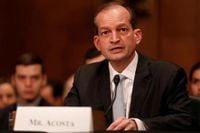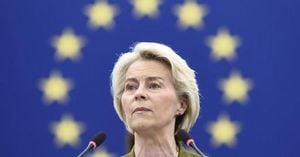The ongoing saga surrounding Jeffrey Epstein’s legacy and his connections to powerful figures took a dramatic turn in late August 2025, as the U.S. House Oversight Committee widened its investigation into the late financier’s affairs and former President Donald Trump launched a multibillion-dollar lawsuit against the Wall Street Journal. These developments have reignited public interest and political discord, with both parties clashing over the scope and motives of the probe.
On August 25, the House Oversight Committee, chaired by Republican Representative James Comer, issued a sweeping subpoena to Epstein’s estate. The committee’s request, addressed to the executors of the estate, called for a trove of documents: Epstein’s will, details of any non-prosecution agreements, extensive financial records, call and visitor logs, and, notably, a leather-bound birthday book compiled for Epstein’s 50th birthday. This book reportedly contains a letter allegedly penned by Donald Trump, a detail that has fueled further speculation about the nature of Trump’s relationship with Epstein and his inner circle.
According to Fox News Digital, the subpoena also demanded “any document or record that could reasonably be construed to be a potential list of clients involved in sex, sex acts, or sex trafficking facilitated by Mr. Jeffrey Epstein.” The estate’s attorneys responded, stating, “As the Co-Executors have always said, they will comply with all lawful process in this matter, and that includes the Committee’s subpoena.” The estate must comply by September 8, 2025, setting the stage for a pivotal moment in the investigation.
The committee’s probe is not limited to paper trails and financial ledgers. Comer announced that Alexander Acosta, the former Trump administration labor secretary and the U.S. attorney who signed off on Epstein’s controversial 2008 non-prosecution agreement, would appear for a closed-door interview on September 19. This agreement, which allowed Epstein to avoid federal charges and serve just 13 months in county jail with work-release privileges, has been widely criticized—especially since it was concealed from more than 30 of Epstein’s underaged victims. The fallout from this agreement played a central role in Ghislaine Maxwell’s federal trial in 2021 and is now a key point in her appeal to the Supreme Court.
As reported by The Miami Herald, the non-prosecution deal also shielded Epstein’s alleged co-conspirators from prosecution, a fact that has continued to draw outrage from the public and victims alike. The Oversight Committee’s subpoena specifically seeks information on this agreement, highlighting the unresolved questions about accountability and justice in the Epstein case.
In parallel with the congressional investigation, Donald Trump has taken legal action of his own. On July 17, 2025, the Wall Street Journal published a report alleging that Trump wrote an inappropriate birthday message for Epstein, which was included in the infamous birthday book. The article claimed that Trump’s note ended with, “Happy Birthday — and may every day be another wonderful secret,” and described his signature as “drawn in a provocative manner.” Trump responded furiously, labeling the report as “FAKE” on social media and calling it “false, malicious, and defamatory.” He has since filed a $10 billion lawsuit against the Wall Street Journal, its parent company Dow Jones & Company, Rupert Murdoch, and the reporters involved.
According to the lawsuit, Trump is seeking damages for what he contends is a deliberate attempt to defame him and damage his reputation. The suit comes at a time when scrutiny of Trump’s connections to Epstein and Ghislaine Maxwell has intensified, particularly after the Department of Justice released audio recordings of Maxwell’s interviews. In these recordings, Maxwell discussed her relationships with Epstein, Trump, and other prominent figures, including former President Bill Clinton.
The Department of Justice has not escaped criticism either. Both the Trump administration and the DOJ have faced bipartisan backlash for their initial reluctance to release investigative records related to Epstein. The DOJ eventually declared the case closed after what it described as an “exhaustive review,” concluding that Epstein died by suicide in a New York City jail in 2019 while awaiting prosecution. The department also stated that there was no “client list,” no evidence of blackmail involving prominent individuals, and that the federal investigation had been thorough.
Yet, the DOJ’s conclusions have not satisfied everyone. On Capitol Hill, the Oversight Committee’s investigation has triggered sharp partisan divides. The committee, which began its probe with rare bipartisan unity, soon found itself mired in political squabbles. Democrats, including Representatives Suhas Subramanyam and Jasmine Crockett, accused Republicans of failing to ask probing questions during former Attorney General Bill Barr’s deposition. Comer, for his part, dismissed these accusations as baseless and urged Democrats not to politicize the investigation.
The committee’s inquiry has also cast a wide net, issuing subpoenas to a host of high-profile individuals: former FBI directors Robert Mueller and James Comey, ex-attorneys general Bill Barr and Loretta Lynch, and former President Bill Clinton and former Secretary of State Hillary Clinton. Barr, who testified last week, told the committee that he had “no knowledge of, nor did he believe, any implications of wrongdoing on President Donald Trump’s part related to Epstein,” according to Fox News Digital. However, Representative Robert Garcia, the committee’s ranking Democrat, countered that Barr did not clear Trump of any involvement.
The renewed investigation has also brought renewed attention to Epstein’s vast and mysterious fortune, which included multi-million dollar properties across the United States and the Caribbean. His estate has already paid significant settlements to victims of his alleged crimes, and the newly subpoenaed financial records could shed further light on the sources and uses of Epstein’s wealth.
Amid these legal and political battles, one thing is clear: the Epstein scandal remains a lightning rod for controversy, raising questions about the accountability of the powerful, the effectiveness of federal law enforcement, and the willingness of Congress to confront uncomfortable truths. With the September 8 deadline for the estate looming and Acosta’s testimony on the horizon, the coming weeks promise to bring new revelations—and likely, more heated debate—about one of the most notorious cases in recent American history.
As the story unfolds, the American public—and indeed, the world—continues to watch closely, hoping for answers and accountability in a saga that has already upended so many lives and reputations.




